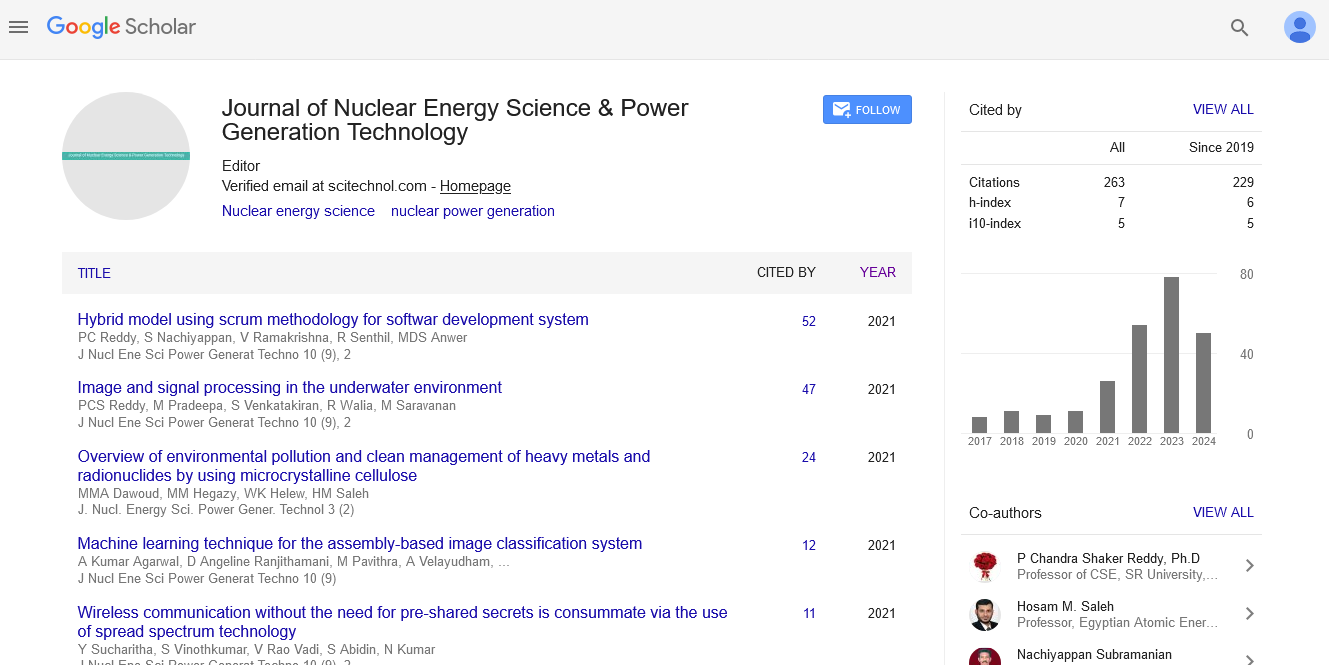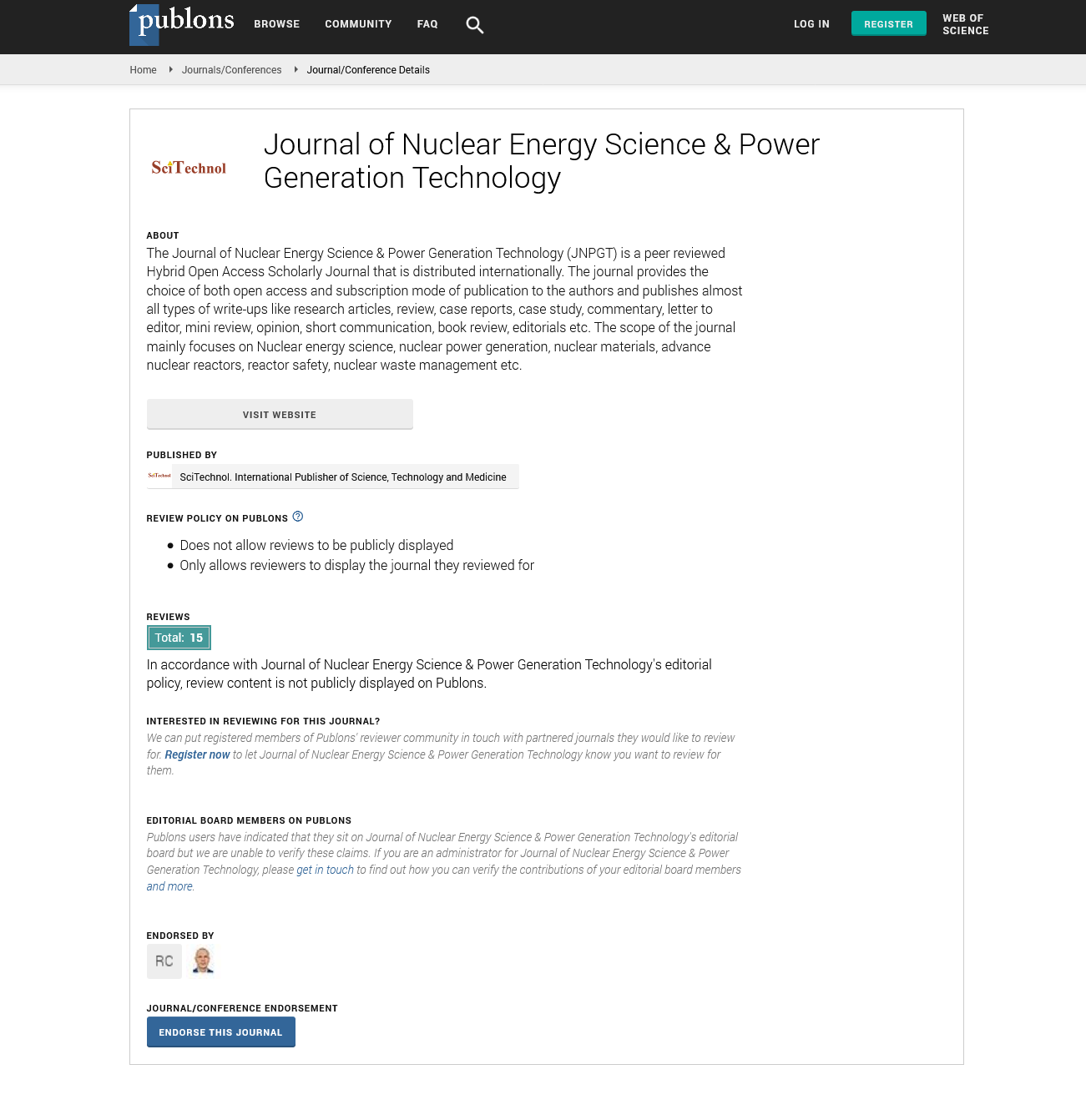Opinion Article, J Nucl Ene Sci Power Generat Technol Vol: 12 Issue: 3
Atomic Energy Power of Atom for a Sustainable Future
Ahar Rasal*
1Department of Nuclear Engineering and Radiation Science, Missouri University of Science and Technology, Missouri, USA
*Corresponding Author: Ahar Rasal,
Department of Nuclear Engineering and
Radiation Science, Missouri University of Science and Technology, Missouri, USA
E-mail: ahar.rasal@gmail.com
Received date: 24 April, 2023, Manuscript No. JNPGT-23-102507;
Editor assigned date: 28 April, 2023, PreQC No. JNPGT-23-102507 (PQ);
Reviewed date: 15 May, 2023, QC No. JNPGT-23-102507;
Revised date: 23 May, 2023, Manuscript No. JNPGT-23-102507 (R);
Published date: 31 May, 2023, DOI: 10.4172/2325-9809.1000337.
Citation: Rasal A (2023) Atomic Energy Power of Atom for a Sustainable Futures. J Nucl Ene Sci Power Generat Technol 12:3.
Keywords: sustainable sources , power
Description
In an era of increasing energy demand and growing concerns about climate change, finding reliable and sustainable sources of power has become a top priority. Among the various energy options available, atomic energy, or nuclear power, stands out as a significant contender. Atomic energy refers to the energy released from nuclear reactions, particularly nuclear fission, which involves splitting the nucleus of an atom.
Process releasing enormous amount of energy
This process releases an enormous amount of energy in the form of heat and radiation. Atomic energy is harnessed in nuclear power plants to generate electricity.
Nuclear fission and chain reactions: Nuclear fission occurs when the nucleus of an atom, typically uranium or plutonium, is bombarded with neutrons, causing it to split into two smaller nuclei. This process releases additional neutrons, which can then trigger a chain reaction, resulting in the continuous release of energy.
Nuclear fusion: In addition to fission, nuclear fusion is another process that can generate atomic energy. Fusion involves the merging of atomic nuclei to form a heavier nucleus, releasing energy in the process. While fusion is a promising technology, it is still in the experimental stage and has not yet achieved commercial viability.
Carbon-free power generation: One of the primary advantages of atomic energy is its low carbon footprint. Nuclear power plants do not emit greenhouse gases during electricity generation, contributing to global efforts to combat climate change and reduce reliance on fossil fuels.
High energy density: Atomic energy offers a remarkably high energy density, meaning that a small amount of nuclear fuel can produce a significant amount of electricity. This efficiency results in lower fuel consumption and reduced costs compared to other energy sources.
Baseload power generation: Nuclear power plants can provide reliable baseload power, meaning they can operate continuously and generate electricity at a constant rate, regardless of fluctuations in demand. This stability makes them a valuable complement to intermittent renewable energy sources, such as solar and wind power.
Energy security and independence: Utilizing atomic energy can enhance a nation's energy security by reducing dependence on imported fossil fuels. Nuclear fuel, such as uranium, can be domestically sourced or obtained from stable trading partners, decreasing vulnerability to geopolitical uncertainties.
Technological advancements and innovation: The development of atomic energy has driven technological advancements in various fields, including materials science, engineering, and radiation detection. These innovations have applications beyond the energy sector and contribute to scientific progress and economic growth.
Nuclear waste management: One of the major challenges associated with atomic energy is the proper management of nuclear waste, which remains radioactive for thousands of year’s safe disposal methods such as deep geological repositories, are important to minimize environmental and health risks. Ongoing research focuses on advanced fuel cycles and recycling technologies to reduce waste and extract additional energy.
Safety and risk mitigation: Safety is a paramount concern in nuclear power plants. Lessons from past accidents, such as Three Mile Island, Chernobyl, and Fukushima, have led to significant improvements in reactor design, safety protocols, and emergency preparedness. Stringent regulations, rigorous inspections, and robust safety culture are essential for preventing accidents and ensuring public confidence.
Advanced reactor technologies: The development of advanced nuclear reactor technologies, including Small Modular Reactors (SMRs), Generation IV reactors, and fusion reactors, offers potential solutions to address safety, waste management, and resource utilization concerns.
Integration with renewable energy: The combination of nuclear power with renewable energy sources, such as wind and solar can create a balanced energy mix that ensures a stable and carbon-neutral electricity grid.
Global expansion: Several countries, including China, India, and the United Arab Emirates, continue to invest in nuclear power infrastructure and plan to expand their nuclear energy capacity in the coming years.
Conclusion
Despite the challenges and concerns associated with nuclear power, its expansion has played a significant role in meeting the increasing demand for electricity and reducing carbon emissions. With ongoing advancements in reactor designs, safety measures, waste management, and international collaboration, nuclear power holds the potential to contribute to a sustainable and low-carbon energy future. Balancing the benefits of clean and reliable electricity generation with the importance of safety, public acceptance, and responsible management of nuclear waste will be difficult as nuclear power continues to expand worldwide.
 Spanish
Spanish  Chinese
Chinese  Russian
Russian  German
German  French
French  Japanese
Japanese  Portuguese
Portuguese  Hindi
Hindi 

